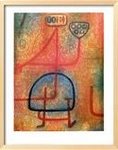What was Starbucks doing selling a spelling bee movie? For the past month, patrons of the ubiquitous coffee franchise have been served caffeine-spiked hits of film advertising, as thermal cups, coasters, and emporia banners promote the Lions Gate picture Akeelah and the Bee. For Starbucks Entertainment, pushing the film marks the next venture after retailing CDs, the company’s first flash that its repeat (read: addicted) customer base consumes other legal forms of stimulation. From the looks of the Akeelah ad copy, in which obscure, esoteric English words are followed by a dictionary definition and a pitch to see the film, the campaign seeks to attract to the theaters a clientele charmed – or at least not irritated – by Starbucks’ own brand-making flair with language (can you spell venti soy decaffeinated caramel macchiato?). Despite such savvy underwriting and generally favorable, low bar-setting “it’s a family film” notices, the movie opened to a tepid $6.01 million. How did Starbucks kill the buzz?
Certainly, we can acquit the java magnate of robbing its own box office by rounding up some usual suspects, starting with the film’s competition opening weekend. While Akeelah bested Disney’s The Wild, it was out-placed by the civic exercise in witness-bearing, United 93, as well as the latest Robin Williams vehicle, RV. That the latter should excel now, when school’s almost out, suggests that audiences are already ditching the heady stuff to prep for this summer’s blithe entertainments. Also, as many reviewers have observed, Akeelah marks yet another spelling bee theatrical, following the 2002 documentary Spellbound, the Broadway musical The 25th Annual Putnam County Spelling Bee, and the 2005 film adaptation of the novel The Bee Season. Shouldn’t we be just about spelled out?
The fine print there on the Starbucks cup – spelling it like it is, changing the world one word at a time– tells us this isn’t just another quirky spelling bee flick, though, and that Starbucks means to brew something more potent in its corporate alliance with Lions Gate. Where Starbucks touts its commitment to “corporate social responsibility,” Lions Gate is the production company that served us Crash, last year’s heavy roasted message movie. In that film, the road accidents that paralyze LA’s highway system stood for the city’s interracial disrepair. In this film, in which a plucky tween from South Central LA spells her way to the national bee, spelling is the unlikely vehicle for neighborhood rehabilitation. Released on the anniversary of the Rodney King riots, and set in Crenshaw, blocks from the scene of Reginald Denny’s wretched truck stop, Akeelah tries to persuade us we can all get along if only we would brush up on our Latin roots.
Okay, perhaps that’s too cynical, but how can a competition that seeks to crown only one winner teach us the value of community building? And while we’re at it: how many Starbucks are there in South Central Los Angeles? (I checked: there is one, in Compton, opened in a joint venture with Magic Johnson’s Johnson Development Corporation.) While urban renewal depends essentially on commercial investment, Starbucks and Lions Gate send out a mixed message when they ground a fundamentally economic proposition on the observance of correct spelling.
Spelling bee enthusiasts will argue that the contest teaches ideals that foster civic responsibility. Intelligence, perseverance, adherence to high standards – who could dispute the merit of what it takes to spell words like pulchritude and prestidigitation? Akeelah and the Bee reaffirms these values as it rewrites the standard spelling bee drama to speak for the concerns of inner city residents. The single mother (Angela Bassett) indifferent to Akeelah’s initial triumphs is too harried from mollifying the officers who dropped off her gang-obsessed son. Instead of drilling Akeelah (Keke Palmer) straight from the Webster’s, the spelling Svengali who trains the prodigy assigns her readings from Nelson Mandela and W.E.B. DuBois. When that coach (Lawrence Fishburne) suddenly releases her from his tutelage, Akeelah recruits family members, gang bangers, and even her mailman to help her study her copious word list. It is at this point that the filmmakers deserve extra credit for making the spelling bee a shared investment as well as a source of neighborhood pride.
However inspirational, the problem is that pride doesn’t carry a checkbook, and that as we join Akeelah’s homeys in rooting her on, we lose track of the wager that compelled her to enter her first bee: Akeelah’s school principal believes that sending a student to the national competition would give Crenshaw Middle School the good press it needs to pay for doors on the lavatory stalls. It would have been easy to make this film, and to make this film inspirational, without making an economic pretext explicit. Having made it, though, it is significant that the film does not follow through on it, and there is a good real-world reason for that: public school funding, the kind that subsidizes toilets, never mind English (or Latin!) classes, does not materialize when one student demonstrates her mastery of standard spelling. It is produced and distributed from tax revenues, and, since 2002, awarded (putatively) when a school demonstrates its ability to meet the percentile standards set by federal law.
Last year in the town of Lincoln, Rhode Island, school officials were blindsided by community protests when they canceled their annual spelling bee because the contest did not help their school meet the “success rates” stipulated by the No Child Left Behind Act. When Akeelah and the Bee focuses increasingly on the singular virtues of its winning protagonist – she attempts to throw the final competition because she feels compassion for her wealthy Asian opponent, bullied by his (stereotypically) unfeeling father – it abandons the humbling conceit of the spelling bee as bake sale and retreats from spelling out the greater injustice, that inner city schools have to compete for public funding from a position of economic disadvantage (and you thought the rules of the spelling bee were harsh). In the 1980s, movies such as Stand and Deliver showed how a class from an urban school depleted by Reaganomics could master calculus to buy their ticket out. In this, the naught decade, spelling is the new math, the feel-good formula for rewarding individuals at the expense of the greater community.
Which brings us back to the film ads littering your neighborhood Starbucks. Designed to look like Akeelah’s flash cards, the coasters try to teach you a new word every time you read the movie’s tag line, Changing the world one word at a time. It would be uncharitable to suggest that the cappuccino crowd that frequents Starbucks is insensible to such words of inspiration. Rather, it is more reasonable to suppose that Starbucks’ regulars didn’t care to be lectured over their latte by such a flagrant marketing gimmick.
In truth, selling spelling makes sense for a company looking to vend culture as well as coffee. For just as Starbucks leavens its promotion of “community building” with the stated necessity for “profitability,” its decision to premier in film with Akeelah and the Bee not only cashes in on spelling’s cultural currency, but also capitalizes on the bee’s collusion with capitalism, a system in which the rewards trickle down, slow-drip style, to the less savvy, less fortunate competitors. When Starbucks printed stirring language on its coffee supplies, it primed its clientele to be charmed – or at least not irritated – by the economic status quo, and by a movie whose featured competition tacitly validates its market incentives for fronting film in the first place. That consumers were not roused to reward Akeelah at the box office suggests they have mellowed on the company’s latest commercial blend.
Wednesday, May 10, 2006
Strange Brew: How Starbucks Spelled "Disappointment" at the Box Office
Subscribe to:
Post Comments (Atom)



4 comments:
Hey, I just learned that the quote the movie attributes to Nelson Mandela ("Our deepest fear is not that we are inadequate . . .") is really from (white bread spirituality diva) Marianne Williamson. Ouch.
Adrian Miller said...
Jardiniere,
Good piece, but I wonder why you weren’t more explicit about the role race may have on this topic. You came close in the paragraph where you talk about the number of Starbuck’s located in South Central LA.
Maybe Starbuck’s gamble didn’t pay off because they targeted a bunch of white yuppies to go see what they probably perceive as a “black movie.” For some, that’s too much to swallow.
Just a thought,
Adrian
Monday, May 15, 2006 4:12:00 PM
Hey Adrian,
I've taken the liberty of copying and pasting your comment down here.
It's a great thought, and thanks for posting it. I suppose there were a couple of reasons I underplayed that angle: (1) I thought the racial subtext to the Starbucks campaign was (sadly) so obvious that I myself was insufficiently explicit about it (no excuse) and (2) I guess I saw Akeelah as a sequel of sorts to Crash, and where Crash tried to foreground the intersection of race with class, this one does so as well, but in a way audiences might not understand, or at least get the flawed logic (i.e., that spelling bees don't yield school funding); they narratively base a "real world" "inspirational story" on an economic implausibility. I think there is a sense in which in choosing the spelling bee for a vehicle the campaign, and the film in turn, makes a spectacle of the (African-American) inner city: like, look, African-American kids can spell! (Do you think that's going too far? Let me know) It's a weighty suggestion in this era of "English first" and the language/curriculum policies being developed around US immigration. . .
For the past month, patrons of the ubiquitous coffee franchise have been served caffeine-spiked hits of film advertising, as thermal cups, coasters, and emporia banners promote the Lions Gate picture Akeelah and the Bee.
Find some additional information on coffee franchises.
Post a Comment